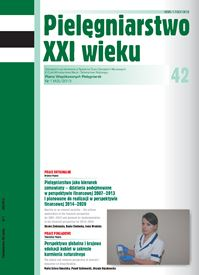Pielęgniarstwo jako kierunek zamawiany – działania podejmowane w perspektywie finansowej 2007–2013 i planowane do realizacji w perspektywie finansowej 2014–2020
Słowa kluczowe:
kierunki zamawiane pielęgniarstwo i położnictwo, promocja zawodów pielęgniarki i położnej, Program Operacyjny Kapitał Ludzki, Europejski Fundusz Społeczny, Strategia Rozwoju Kapitału Ludzkiego, Krajowa Strategia Rozwoju RegionalnegoAbstrakt
PIELĘGNIARSTWO JAKO KIERUNEK ZAMAWIANY – DZIAŁANIA PODEJMOWANE W PERSPEKTYWIE FINANSOWEJ 2007–2013 I PLANOWANE DO REALIZACJI W PERSPEKTYWIE FINANSOWEJ 2014–2020
Wprowadzenie. Polska podobnie jak inne kraje doświadcza niedoboru kadr medycznych. Szczególnie trudna sytuacja odnosi się do pielęgniarek. Zauważalny jest proces starzenia się pracowników, coraz większa skala dezaktywizacji zawodowej, której nie równoważy napływ nowych osób do zawodu. Od dłuższego czasu notuje się brak zainteresowania studiami na kierunkach pielęgniarstwo i położnictwo, a przyznawany corocznie limit przyjęć na te kierunki nie był w pełni wykorzystywany. W związku z tym działanie polegające na wpisaniu pielęgniarstwa na listę kierunków zamawianych oraz szerokie promowanie zawodu pielęgniarki powinno mieć wpływ na zwiększenie zainteresowania podejmowaniem kształcenia w tym zawodzie w Polsce. Podkreślić należy, iż przedmiotowe działanie jest zgodne z kierunkami rozwiązań na rzecz zapewnienia wystarczającej ilości kadr medycznych w Europie i poszczególnych krajach członkowskich, określonych przez Komisję Europejską w dokumencie pn. „Zielona księga w sprawie pracowników służby zdrowia w Europie”.
Cel pracy. Celem pracy jest przedstawienie działań podejmowanych przez Ministerstwo Zdrowia mających na celu umieszczenie pielęgniarstwa na liście kierunków zamawianych przez Ministra Nauki i Szkolnictwa Wyższego, dofinansowanych w ramach Programu Operacyjnego Kapitał Ludzki w perspektywie finansowej 2007-2013 oraz zaprezentowanie działań zaplanowanych do realizacji w perspektywie finansowej 2014-2020, dotyczących kształcenia pielęgniarek i położnych oraz promocji tych zawodów.
Wnioski. W perspektywie finansowej 2007-2013 nie było możliwości wpisania pielęgniarstwa na listę kierunków zamawianych przez MNiSW, dofinansowanych ze środków EFS w ramach POKL, ale stworzono możliwość dofinansowania kształcenia na kierunku pielęgniarstwo w Działaniu 4.3 w ramach obszaru „Nauki medyczne w zakresie medycyny i opieki nad osobami starszymi: pielęgniarstwo, fizjoterapia, geriatria, medycyna oparta na terapii genowej”. W perspektywie finansowej 2014-2020 zaplanowano realizację przedsięwzięć dotyczących wpisania pielęgniarstwa i położnictwa na listę kierunków zamawianych przez Ministra Zdrowia oraz promocji zawodów pielęgniarki i położnej.
Bibliografia
1. Strategia Rozwoju Kapitału Ludzkiego - projekt z 31.07.12 r. w: www.mpips.gov.pl
2. Zielona Księga w sprawie pracowników służby zdrowia w Europie, COM(2008)725.
3. Zielona Księga. Unowocześnienie dyrektywy w sprawie uznawania kwalifikacji zawodowych, KOM(2011)367.
4. European Observatory on Health Systems and Policies, Investing in Europe´s health workforce of tomorrow: Scope tor innovation and collaboration. Summary report of the three Policy Dialogues; Leuven, Belgia, 26-30.IV.2010.
5. Stanowiska XV Krajowego Zjazdu Delegatów PTP z dn. 27.11.2009 r.: w sprawie umieszczenia na liście kierunków studiów objętych Programem „Kierunki Zamawiane” Kierunku – Pielęgniarstwo oraz w sprawie Promocji Zawodu Pielęgniarki.
6. Stanowisko Ministra Nauki i Szkolnictwa Wyższego z 1.03.2010 r., znak sprawy: MNiSW-DWI-WKL-520-1131-12/AMA/10.
7. Zamawianie kształcenia na kierunkach technicznych, matematycznych i przyrodniczych w: www.nauka.gov.pl/finansowanie /fundusze -europejskie/.
8. Program Operacyjny Kapitał Ludzki, Priorytet IV, Szkolnictwo Wyższe i Nauka, Wiedza dla postępu, MNiSW, Warszawa 2008.
9. Stanowisko Ministra Nauki Szkolnictwa Wyższego z 15.02.2011r., znak sprawy: MNiSW-DWI-WKL-520-1131-17/WB/11.
10. Narodowe Centrum Badań i Rozwoju, pismo z 22.11.2011, znak sprawy: NCBiR-DWPOKL-SKIWPOKL-20-1/PK/2011/2137.
11. Narodowe Centrum Badań i Rozwoju, pismo z 6.03.2012, znak sprawy: NCBiR-DWPOKL-SKIWPOKL-20-8/PK/2012/1233.
12. Analiza zapotrzebowania gospodarki na absolwentów kierunków kluczowych w kontekście realizacji Strategii Europa 2020. Raport końcowy, kwiecień 2012 r. w: www.ncbir.gov.pl fundusze europejskie – kapitał ludzki.
13. Plan działania na 2012 dla Priorytetu IV PO KL, Ministerstwo Rozwoju Regionalnego.
14. Dokumentacja konkursowa PO KL, Priorytet IV, Działanie 4.3 Wzmocnienie potencjału dydaktycznego uczelni w obszarach kluczowych w kontekście celów Strategii Europa 2020 w: www.ncbir.gov.pl fundusze europejskie – kapitał ludzki.
15. Ustawa z dn. 6.12.2006 r. o zasadach prowadzenia polityki rozwoju (Dz. U. z 2009 r. Nr 84, poz. 712 z późn. zm.).
16. Wstępna ocena zasobów kadrowych pielęgniarek i położnych Polsce, do roku 2020, Naczelna Rada Pielęgniarek i Położnych, Warszawa, czerwiec 2010.
17. Departament Pielęgniarek i Położnych, pismo z 31.03.2010 r. znak sprawy: MZ-PP-079-3377-84/KW/10 oraz pismo z 7.09.2012 r. znak sprawy: MZ-PP-079-8178-1/DZ/12.
18. Zarządzenie Ministra Zdrowia z 21.09.2011r. w sprawie powołania zespołu ds. opracowania dokumentów programowych dla nowej perspektywy finansowej funduszy strukturalnych na lata 2014-2020 w obszarze zdrowia (Dz.Urz.MZ.2011.7.65 i z 2012r. poz. 68).
Pobrania
Opublikowane
Numer
Dział
Licencja
Prawa autorskie (c) 2013 Dorota Zinkowska, Beata Cholewka, Irena Wrońska (Autor)

Utwór dostępny jest na licencji Creative Commons Uznanie autorstwa 4.0 Międzynarodowe.




